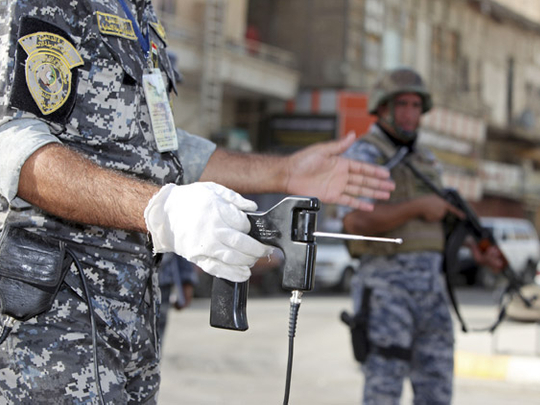
After the shock waves created by the statement of Iraqi army general Babekir Zibari, when he advised politicians to extend US military presence in Iraq until 2016, Iraqi Defence Minister Abdul Qader Obaidi rephrased Zibari's words and extended the period to 2020.
However, this time no one was surprised when Obaidi said that some form of US military presence will be needed in Iraq.
No doubt, this will call for private contractors to step in.
Past experience in Iraq points heavily to the role of ‘private security companies'.
Historically, there is nothing new about the US military's use of private contractors, but the war in Iraq witnessed outsourcing on a huge scale. As it seems, the US policy change of recruiting such firms came after the collapse of the Soviet Union and the end of the Cold War era. The Pentagon was downsizing under then secretary of defence Dick Cheney.
The world of ‘private warriors' as they are known in the western world, or ‘mercenaries' in the Arab and Iraqi culture have two very different meanings. A mercenary in the region's culture does not hold a respectable or happy definition, while ‘private combatants' are in many cases a must in modern western warfare.
In Iraq, the notion of ‘private warriors' also explores a very different kind of contractor, where the private world of security teams work for firms such as Blackwater, Aegis and Erinys.
Bashar Ameen, an Iraqi engineer, was caught in the shootout initiated by a Blackwater team while he was driving through the Al Nusoor square area in September 2007. He was lucky to be one of the 24 who were only injured at the time.
He sent me a note, along with the photos of his bullet and shrapnel riddled body at the time, telling me that he was still unable to grasp the fact that he was not among the 17 people who were killed. Looking at the photos of the uncalled for shootout at unarmed civilians three years after the incident is still infuriating
The Pentagon's increasing reliance on outsourcing military functions raises important questions about accountability and the chain of command. An understanding will be reached between the United States and the Iraqi government regarding a US training and security body on the ground after December 2011 — an issue which needs to be looked into seriously by Iraqi law-makers.
Some of the dangers in bringing in the private sector to prosecute the war, or the day after, are instilled in the way these private contractors act when confronted with a situation. Unlike the army, they have their set of rules and conduct regulations.
The US had and still has tens of thousands of armed contractors in Iraq defending the Green Zone, and the military. However, they are not part of the military command structure. And as we experienced first-hand, there can be trouble when private contractors carry weapons and have tactical responsibilities.
After the Blackwater incident, I interviewed General David Petraeus. At the time he was the top US Commander in Iraq. I asked him about Blackwater. He said that the Uniform Code of Military Justice can and will be extended to private military companies (PMCs) who are under a Department of Defence (DoD) contract.
Blackwater is a contractor for the Department of State, not Defence.
Relaxed accountability
So in black and white, we understand that contractors under contract with the DoD are under certain obligations, but as long as their contracts are with the Department of State, we shall see a different sort of accountability which is "relaxed" at its best.
Talking to a key official at the US embassy in Baghdad who spoke on condition of anonymity, he said that the two major security firms operating with the Department of State-US Embassy are mostly protected by two major players: Triple Canopy and Dyncorp.
Triple Canopy was accused of hiring former Blackwater employees. However, they have been cleared of the charge and as such, they should have no former Blackwater employees working for them.
Both are likely to take most of the security contracts for the future embassy security force in Iraq, but the situation is still not 100 per cent certain and other bidders may come along.
Looking into the US official's words and connecting them with a number of facts in Iraq, draws another bleak and concerning picture.
First, the security company Blackwater Worldwide formed a network of 30 shell companies and subsidiaries to try to get millions of dollars in government business after the company faced strong criticism for reckless conduct in Iraq. A couple of these companies obtained government contracts.
Can we be a 100 per cent assured that none of the 33 shell companies will slip, by mistake, into Iraq?
Second, the United States will conduct all its future business in Iraq through the Department of State after the complete military drawdown of 2011. How will all the training and security companies be controlled? Will they be under the Iraqi code or the US code?
The Iraqi political scene leaves a lot to be desired and after six months, the country is still without a government.
So the way in which this very poor performing political entity will try to control expert ‘private warriors' will be food for very colourful imagination.










